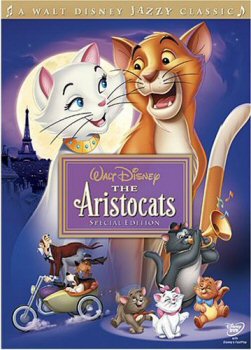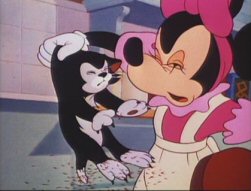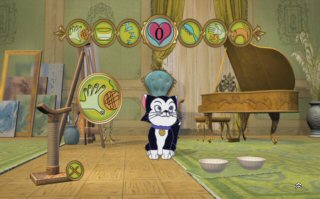At the time of its release, though, adult critics weren't
as kind as kids. The AristoCats was the first animated
film with no involvement from the master himself -- the
late Walt Disney, and comparing quality to Walt's vision,
the movie does suffer. Yet in hindsight, it's still a pretty
vibrant kids' movie even with some obvious cutting of corners
where the animation is concerned.
The studio seemed to have a repertory cast - animation
wasn't attracting the big name actors -- and The AristoCats
utilizes its actors more effectively than in the later Robin
Hood. Eva Gabor stars as the sophisticated white cat
Duchess, but the movie really belongs to her kittens, Marie,
Berlioz and Toulouse before Phil Harris (Baloo) steals it
away as Thomas O'Malley the Alley Cat. For good measure,
Sterling Holloway (Winnie the Pooh) appears as Disney's
first French rat (take that, Remy), without adopting any
discernible accent.
The plot itself isn't that far-fetched, nor actually all
that unique for Disney. In 1910 Paris, a retired opera singer
adjusts her will to bequeath everything to Duchess and the
kittens, incurring the wrath of her butler Edgar. Consequently,
he drugs them and dumps them out in the countryside, where
they have wild misadventures trying to return home.
Perhaps most memorably, the cats fall in with a group
of Bohemian felines, who teach the formerly uptight and
staid kittens about jazz. Though "Everybody Wants to Be
a Cat" may echo "I Wanna Be Like You," Scatman Crothers
lifts to a whole different level - along with experimental
lighting techniques from the studio, trying to make the
scene very now and with it for 1970.
Some of those efforts work better than others. What had
critics annoyed then was that the movie veers back and forth
in quality, just like Edgar's escape cycle. In cityscapes,
the art becomes two-dimensional, and throughout you can
see stray pencil marks where either the animators were rushed
and didn't clean up properly, or director Wolfgang Reitherman
just didn't care. Perhaps it's part of the stylization,
and it's not so much distracting as calling attention to
these characters as drawings. Who's to say if that's something
Disney himself would have approved?
Without getting the Platinum treatment, this movie still
gets loaded with nice extras. Songwriter Richard M. Sherman
digs out a "lost song," and it's always a treat to get a
look into the archives for production art and discarded
storyboards. Though Sherman may not understand why the number
was cut, we can figure out it's because it calls for a level
of human/feline interaction that the rest of the movie just
doesn't have. Like 101 Dalmatians, The AristoCats
keeps the line that humans do not understand animal speech.
The Shermans show up again in a little featurette of their
own, along with a Walt-hosted show from the 1950's, "The
Great Cat Family." Completely missing from disc descriptions
but a cool surprise, the studio included a short featuring
Figaro, the cat from Pinocchio. Until this, I didn't
know they'd done any.
But it's not all looking into the past, trying to polish
up history a bit. In perhaps the most fiendishly clever
DVD extra Disney Home Video has devised, The AristoCats
comes complete with a virtual kitten. While not quite as
time-consuming as a Webkin or a Tamagochi, this cute little
AristoKitten (you can choose from a couple of types) should
soak up a lot of kids' attentions.
A word to the wise, though; set it up on your PC. Though
the Virtual Kitten works on a regular DVD player, using
it as a DVD-ROM provides extra functions, games and a printable
cat license. It's hands-down the most fun use of DVD technology
a Disney movie has had, and kudos to them for figuring it
out.
So it's not the best movie the Disney Studio ever produced.
I'm really glad to have it to show to my kids, and you should
be, too.
The
Aristocats (Special Edition)








